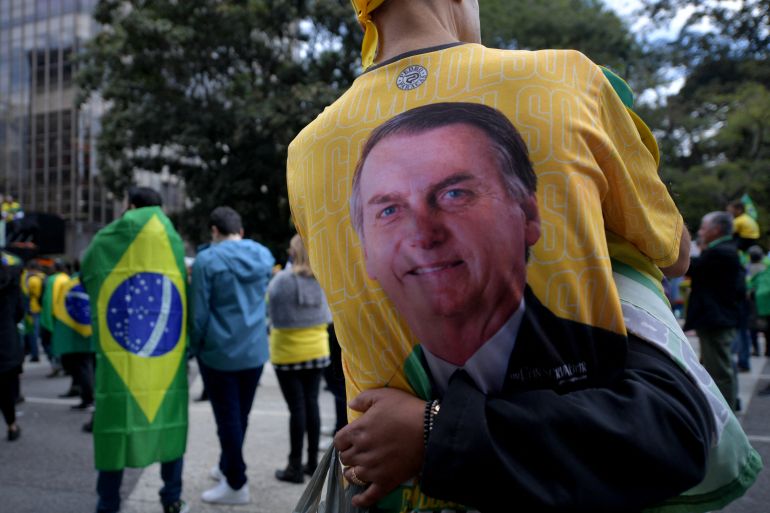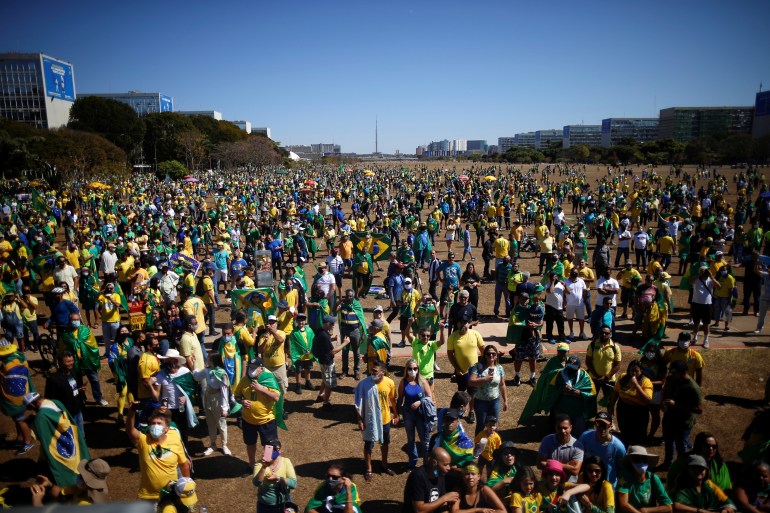Bolsonaro’s election fraud claims spark ‘unprecedented crisis’
Brazil’s president is parroting Donald Trump’s fraud claims to prepare to contest next year’s elections, experts say.

Sao Paulo, Brazil – Without proof and in contradiction of experts, Brazil’s President Jair Bolsonaro has for many years decried the country’s electronic voting system as vulnerable to fraud.
But in recent weeks, amid plummeting approval ratings, the far-right populist has aggressively talked up his claims in a series of interviews, broadcasts and meetings with supporters, thousands of whom demonstrated this month in support of Bolsonaro’s call to change the system.
Keep reading
list of 4 itemsBrazil judges push back against Bolsonaro’s election fraud claims
Brazil’s president hits out at new probe into voting fraud claims
Brazil top justice orders Bolsonaro investigated for fraud claims
“We cannot have dubious elections in 2022. Public counting of votes is needed,” the president said in a recent radio interview.
Analysts widely consider that Bolsonaro is preparing to contest next year’s elections, which recent opinion polls suggest he would lose by a large margin to former President Luiz Inacio Lula da Silva of the left-wing Worker’s Party if he decides to run.
“Bolsonaro has been following the steps of [former US President Donald] Trump since the beginning of his government,” said Daniela Campello, a professor of politics at Brazil’s Getulio Vargas Foundation.
“The more he realises he’s not going to win, the more he realises he has nothing to lose.”
‘Potential for violence’
In a note released on Tuesday, the Eurasia Group consultancy wrote that the chances of the election results not being accepted were “less than 5 percent” but that a contested election would “likely follow the US script” with “potential for violence” and “exacerbated polarization and distrust in state institutions”.
Bolsonaro, a former Brazilian army captain and outspoken admirer of the country’s 1964-85 military dictatorship, was visibly Trump’s most enamoured international ally during the US president’s time in office, even though the relationship was not quite reciprocal.
He publicly parroted Trump’s accusations of election fraud in the former real estate mogul’s November 2020 defeat to Joe Biden, even repeating the claims to White House national security adviser, Jake Sullivan, who visited Brazil last week, according to a report published by O Globo.
Now, his repeated and unfounded allegations of fraud marring Brazil’s voting system, combined with continuing verbal attacks on Brazil’s Supreme Court justices, have sparked what many observers are calling an “unprecedented crisis” between the executive and the judiciary.
“It’s a very delicate situation,” said Rafael Cortez, a political scientist at the Tendencias Consultancy in Sao Paulo. “It’s a conflict that will be difficult to resolve in the short term.”
Inquiries ordered
On Wednesday, Supreme Court Justice Alexandre de Moraes placed Bolsonaro under investigation in an ongoing “fake news” inquiry, which followed the opening of another inquiry at Brazil’s top electoral court over the president’s claims.
The decisions came after the president claimed in a recent live broadcast to have proof of fraud in Brazil’s last elections, in 2018. He could possibly be banned from participating in the 2022 elections if the electoral court inquiry concludes that he used his position to spread misinformation.
The president reacted angrily to the decisions, threatening to “act outside of the four lines of the constitution” in an interview with a right-wing radio show, without specifying exactly what he meant.
Bolsonaro won the 2018 elections by a reasonable margin in the second-round runoff against Worker’s Party candidate Fernando Haddad but has continued to insist that fraud prevented him from winning in the first round.
He has systematically failed to provide any remotely serious evidence to back up that claim, however, and during the broadcast merely presented several old social media videos before admitting he did not have proof. “We don’t have proof, I’ll make it clear, but we have clues,” he said.
Brazilian opposition senators reacted angrily.
“I don’t know what’s worse: a president so stupid that he believes in WhatsApp conspiracy theories or such a scoundrel who invents WhatsApp conspiracy theories,” Alessandro Vieira, a senator with the centrist Citizenship Party, said.
Brazil’s Association of Federal Criminal Forensics Experts issued a statement saying there were no issues with Brazil’s electronic voting machines that have been used since 1996.
‘Little appetite’ for change
Bolsonaro, meanwhile, has recently rallied around an amendment that would adopt printed ballot receipts that could be counted physically in the case of voting disputes, widely blasted by experts as far more insecure and vulnerable to voter intimidation and vote-buying than the current system.
The printed ballot measure was recently defeated in a congressional commission. But House Speaker and Bolsonaro ally Arthur Lira plans to take it to a vote on the House floor, where it is expected to be defeated again.
“It seems today that there is little appetite on the part of lawmakers for such a change,” said Naue de Azevedo, a political scientist based in the capital Brasilia and editor of Pauta no Ponto, a website dedicated to coverage of Brazil’s Supreme Court.

Meanwhile, Cortez of Tendencias Consultancy said that amid growing scandals being uncovered by a Senate inquiry into the government’s handling of the COVID-19 pandemic, Bolsonaro is seeking to protect himself against the risk of not finishing his mandate.
To that end, he has invited into his government members of the “Big Centre” Congress bloc, notorious for horse trading.
Bolsonaro recently appointed heavyweight, centre-right Senator Ciro Nogueira to be his chief of staff in what was widely seen as an attempt to shore up protection against impeachment, which opinion polls suggest a majority of Brazilians now support, and against the Senate inquiry.
“They benefit from this weak government,” Cortez said, of the centrist bloc members. “And for these reasons, there isn’t the political space for impeachment.”